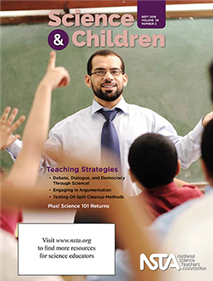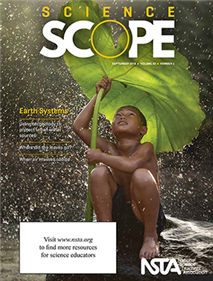All Resources
Journal Article
Killing Two Birds With One Stone
Integrating science and English/language arts instruction with interactive science notebooks....
Journal Article
Debate, Dialogue, and Democracy Through Science!
Using controversial issues to develop scientific literacy and informed citizenship....
Journal Article
The use of mnemonics as an effective strategy to support the integration of writing in science for students with disabilities....
Journal Article
Strategies for early elementary and English language learners...
Journal Article
Testing Oil Spill Cleanup Methods Ethically
Strategies to develop students’ ethical habits of mind in science-integrated engineering....
Journal Article
Science and Children’s editor shares thoughts regarding the current issue....
Journal Article
The Early Years: Begin With Open Exploration
This column discusses resources and science topics related to students in grades preK to 2. This issue discusses ways to encourage children to engage in open exploration to learn about living organisms....
Journal Article
The Poetry of Science: Teaching Strategies
Building literacy in playful, meaningful ways. This poem introduces observation and the skills of a natural scientist....
Journal Article
This column provides background science information for elementary teachers. This issue discusses phenomenon-based learning and activities to use in the science classroom....
Journal Article
Model the movement of energy through the water cycle....
Journal Article
Explore plate tectonics with this series of lab investigations....
Journal Article
Use anchoring phenomena to explain air mass interactions....
Journal Article
Use parks to introduce the three rock types and the rock cycle....
Journal Article
From the Editor's Desk: Earth: The Ultimate Recycler
Science Scope’s editor shares thoughts regarding the current issue....
Journal Article
Integrating Technology: Using Science and Technology to Protect Urban Water Sources
This column shares how teachers use technology for assessment, student learning, or classroom management. In this article, the authors describe an eighth-grade science lesson in which the teacher discussed with her students science-based recommendati...
Journal Article
Teacher’s Toolkit: Community Connections
This column provides how-to strategies and practical advice for the science teacher. This issue describes how the author fosters more communication between her students and their families in her sixth-grade science classroom by incorporating Communit...




